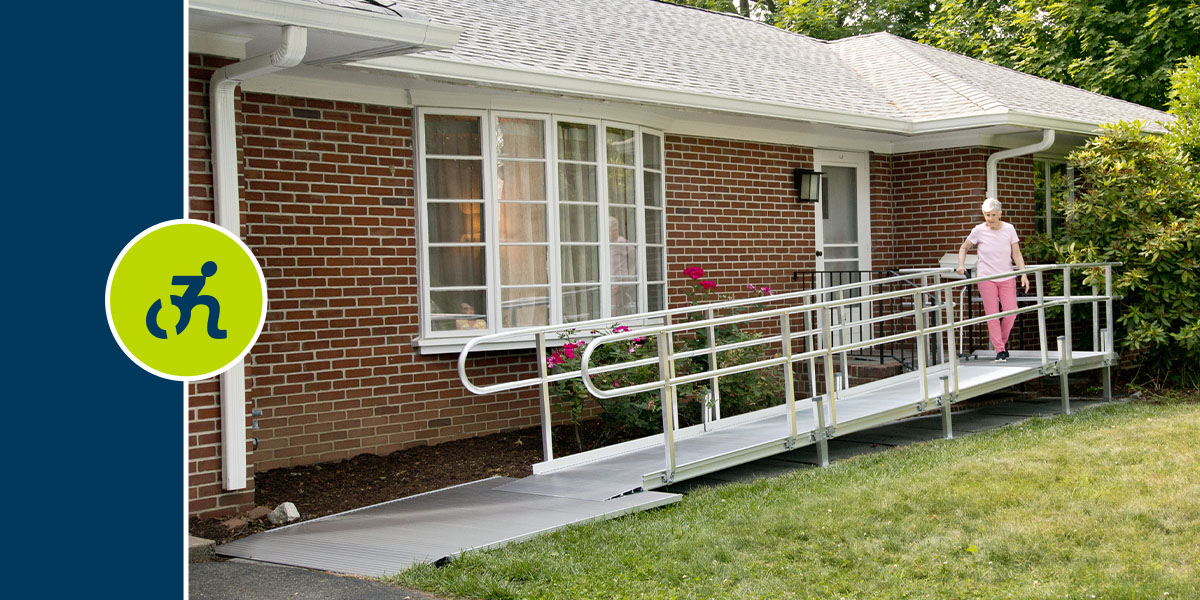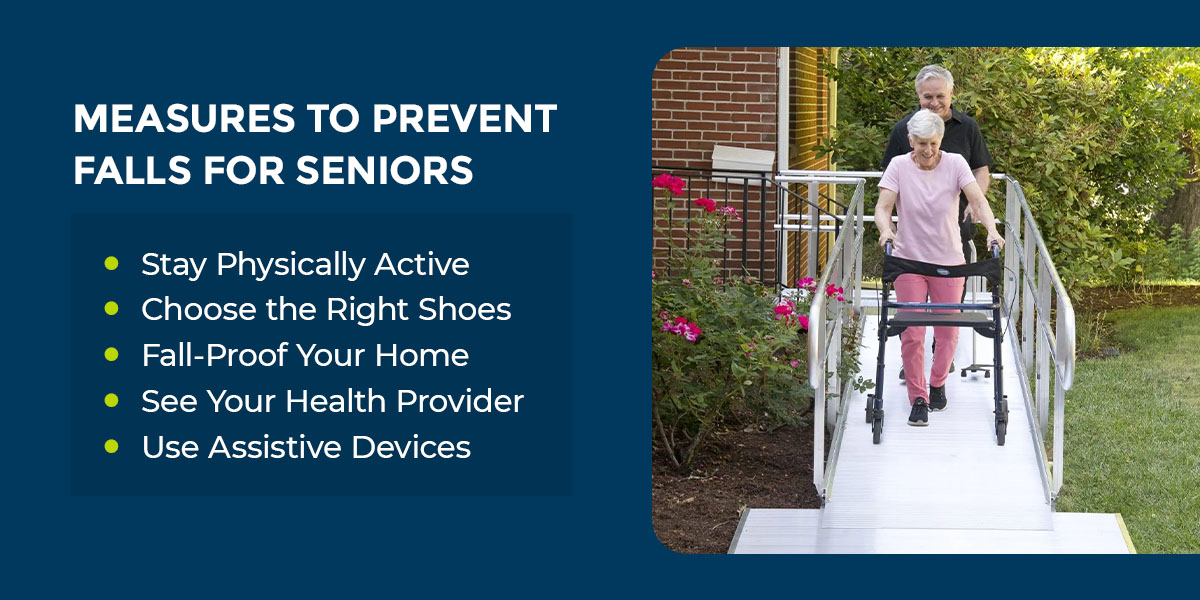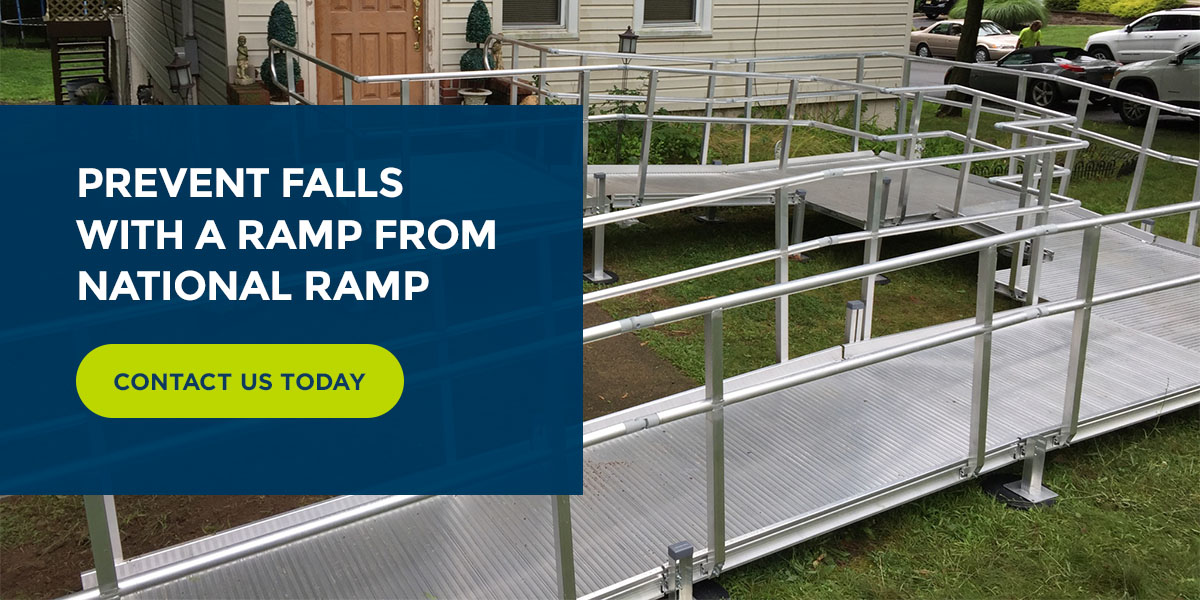
Falls are the leading cause of injury for older adults, with 36 million reported among Americans aged 65 and older each year. Fortunately, falls are also highly preventable. By keeping up with exercise, making your home safer and using assistive devices, you can help prevent falls and the injuries they cause.
What Causes Older People to Fall?
As we age, poor balance and weak muscles can lead to more accidents, falls and fractures. Certain medications can also cause side effects that increase the risk of falls in the elderly, such as those used to treat heart disease, diabetes or problems with the thyroid nerves or blood vessels.
You may be more likely to fall if you:
- Have fallen in the last year
- Have a health condition that impacts your balance, like diabetes or heart disease
- Have trouble walking or standing up from a sitting position
- Take different medicines, such as those that help you relax or sleep
- Have trouble seeing or vision issues like glaucoma or cataracts
- Have a mild cognitive impairment
In addition to these factors, home hazards can lead to falls, such as slippery mats, unlit walkways and hard-to-reach items. It’s crucial to be aware of these risk factors so you can help yourself or a loved one stay safe.
Measures to Prevent Falls for Seniors
While the risk of falling increases as you age, several simple changes can help lower your chances and keep you safe. From adding certain exercises to your routine to removing hazards from your home, here are fall prevention tips you or a loved one can implement:
Stay Physically Active
Many exercises can keep the joints, tendons and ligaments flexible to prevent balance issues in the elderly. Working out might also slow bone loss from osteoporosis, a disease common among older adults that makes the bones weaker and more likely to break.
Work balance and strength training exercises into your routine like:
- Walking or climbing stairs
- Yoga or Pilates
- Wall pushups
- Squats
- Leg lifts
- Sit to stand
- Shoulder rolls
It’s recommended that older adults get at least 150 minutes of moderate-intensity exercise a week, such as brisk walking. You should also try to spend at least two days of the week doing strength training exercises.

Choose the Right Shoes
It’s important to wear suitable footwear at all times. Shoes that don’t support the feet could cause issues that make it difficult to walk. The best shoes are:
- Rubber-soled
- Low-heeled
- Sturdy and flat
- Nonskid
- Properly-fitting
Prevent falls by always wearing non-slip soles, even inside your home. Avoid walking barefoot or wearing slippers and socks, as these can lead to slipping. The right shoes can lower the risk of injury and might also reduce joint pain.
Fall-Proof Your Home
Removing hazards from your home is crucial to fall risk prevention. Tips for specific areas of the home include:
- Stairways and hallways: Remove items you can trip over — including books, electrical cords, clothes or papers — from your stairs and other places you walk. Keep these areas brightly lit so you can see better.
- Kitchen: Ensure your kitchen items are easy to reach without using a step stool, and keep items you use most often at waist level. If you must store something up high, use a “reach stick” or ask for help rather than standing on a chair or table.
- Living room: Use double-sided tape to keep your rugs from slipping, and arrange your furniture so it isn’t in your way when you walk. Also, make sure your chairs and sofas are the right height for you to get in and out of easily.
- Bathrooms: Install grab bars near toilets and on either side of the tub and shower. You might also use nonskid mats or strips on surfaces that can get wet to reduce the risk of slipping. Light the area by keeping a lamp on or using a nightlight that turns on automatically when it gets dark.
- Bedrooms: Keep a lamp within reach of your bed if you need to get up in the middle of the night. Additionally, quick access to a flashlight is essential if the power goes out. These items can help you see better and lower your chance of tripping or falling at night.
- Outdoor spaces: If you have an older loved one, clear their lawn, porch or deck of debris to prevent falls. Non-slip mats by stairways and doors can also help, as can treating walkways with ice melt products or stand to make them less slippery.
See Your Health Provider
Check with your health provider about how to safely use the medications you’re taking. Doing so can help you prevent falls, as some medicines can make you sleepy or dizzy.
It’s also important to take care of your vision. Have your eyesight checked and ensure you’re wearing the right prescription strength of glasses or contact lenses. If you have osteoporosis, ask your doctor about steps you can take to prevent further bone loss and lower your risk of fractures.
You might also ask your doctor about taking certain supplements like vitamin D, which is reported to prevent falls in seniors. In addition, try to get enough sleep and limit alcohol use, which can contribute to dizziness.
Use Assistive Devices
Assistive devices like ramps, handrails and canes can help you feel steady when you walk. Talk to your health provider about the devices you might use to prevent falls, such as:
- Nonslip treads for wooden steps
- Raised toilet seats
- Grab bars for the shower or tub
- Ramps
A ramp is often the best mobility solution, as it mitigates the chances of slipping and falling that come from staircases. Professional ramp installation can give you or a loved one greater independence and flexibility.

Prevent Falls With a Ramp From National Ramp
While the risk of falls can increase as you age, many measures can be taken to keep you safe. At National Ramp, we supply ramps that are safe and durable in any kind of weather with high traction and non-slip surfaces, reducing the risk of falls and injuries at home. With customizable options, you’re sure to find a style that complements your home and lifestyle.
Our ramps are ADA-compliant, and we can install them in three days or less. Contact us today to discuss your needs and find the best ramp for you.
Don’t Risk Injury To You Or A Loved One
Why wait? Give us a call at 877-596-7293 or contact us online to get started!